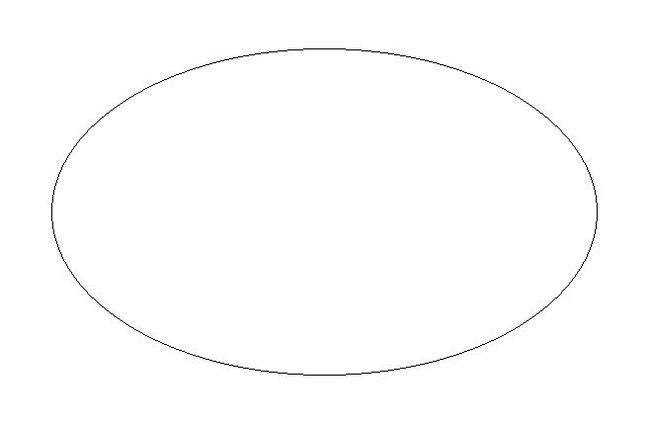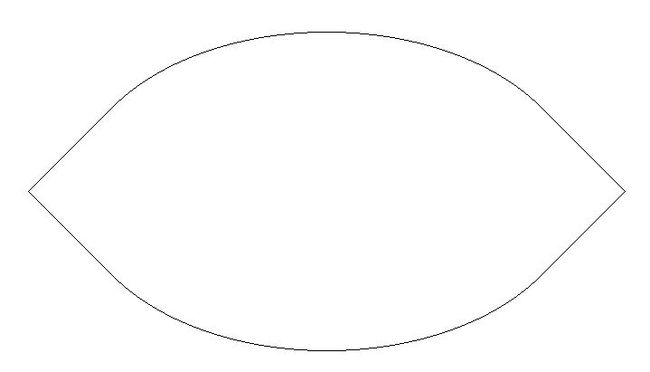中点椭圆算法的实现
中点椭圆算法和中点画圆算法的原理挺相似的。决策参数的计算过程也相近。本人在codeblocks下用win32 api写了简单的演示程序,但是发现了一些问题,稍后提出。
#include <windows.h>
#include <math.h>
/* Declare Windows procedure */
LRESULT CALLBACK WindowProcedure (HWND, UINT, WPARAM, LPARAM);
void EllipsePlotPoints (HDC hdc, int xc, int yc, int x, int y);
void EllipseMidpoint (HDC hdc, int xc, int yc, int rx, int ry);
/* Make the class name into a global variable */
char szClassName[ ] = "CodeBlocksWindowsApp";
int WINAPI WinMain (HINSTANCE hThisInstance,
HINSTANCE hPrevInstance,
LPSTR lpszArgument,
int nCmdShow)
{
HWND hwnd; /* This is the handle for our window */
MSG messages; /* Here messages to the application are saved */
WNDCLASSEX wincl; /* Data structure for the windowclass */
/* The Window structure */
wincl.hInstance = hThisInstance;
wincl.lpszClassName = szClassName;
wincl.lpfnWndProc = WindowProcedure; /* This function is called by windows */
wincl.style = CS_DBLCLKS; /* Catch double-clicks */
wincl.cbSize = sizeof (WNDCLASSEX);
/* Use default icon and mouse-pointer */
wincl.hIcon = LoadIcon (NULL, IDI_APPLICATION);
wincl.hIconSm = LoadIcon (NULL, IDI_APPLICATION);
wincl.hCursor = LoadCursor (NULL, IDC_ARROW);
wincl.lpszMenuName = NULL; /* No menu */
wincl.cbClsExtra = 0; /* No extra bytes after the window class */
wincl.cbWndExtra = 0; /* structure or the window instance */
/* Use Windows's default colour as the background of the window */
wincl.hbrBackground = (HBRUSH) GetStockObject(WHITE_BRUSH);
/* Register the window class, and if it fails quit the program */
if (!RegisterClassEx (&wincl))
return 0;
/* The class is registered, let's create the program*/
hwnd = CreateWindowEx (
0, /* Extended possibilites for variation */
szClassName, /* Classname */
"Code::Blocks Template Windows App", /* Title Text */
WS_OVERLAPPEDWINDOW, /* default window */
CW_USEDEFAULT, /* Windows decides the position */
CW_USEDEFAULT, /* where the window ends up on the screen */
544, /* The programs width */
375, /* and height in pixels */
HWND_DESKTOP, /* The window is a child-window to desktop */
NULL, /* No menu */
hThisInstance, /* Program Instance handler */
NULL /* No Window Creation data */
);
/* Make the window visible on the screen */
ShowWindow (hwnd, nCmdShow);
/* Run the message loop. It will run until GetMessage() returns 0 */
while (GetMessage (&messages, NULL, 0, 0))
{
/* Translate virtual-key messages into character messages */
TranslateMessage(&messages);
/* Send message to WindowProcedure */
DispatchMessage(&messages);
}
/* The program return-value is 0 - The value that PostQuitMessage() gave */
return messages.wParam;
}
/* This function is called by the Windows function DispatchMessage() */
LRESULT CALLBACK WindowProcedure (HWND hwnd, UINT message, WPARAM wParam, LPARAM lParam)
{
static POINT ptBeg, ptEnd;
static int xc, yc, rx, ry;
PAINTSTRUCT ps;
HDC hdc;
switch (message) /* handle the messages */
{
case WM_LBUTTONDOWN:
ptBeg.x = LOWORD (lParam);
ptBeg.y = HIWORD (lParam);
xc = yc = rx = ry = 0;
ptEnd = ptBeg;
break;
case WM_MOUSEMOVE:
if (wParam & MK_LBUTTON)
{
hdc = GetDC (hwnd);
SelectObject (hdc, GetStockObject(BLACK_PEN));
SetROP2 (hdc, R2_NOTXORPEN);
EllipseMidpoint (hdc, xc, yc, rx, ry);
ptEnd.x = LOWORD (lParam);
ptEnd.y = HIWORD (lParam);
xc = 0.5 *(ptBeg.x + ptEnd.x);
yc = 0.5*(ptBeg.y + ptEnd.y);
rx = fabs (ptEnd.x - ptBeg.x);
ry = fabs (ptEnd.y -ptBeg.y);
EllipseMidpoint (hdc, xc, yc, rx, ry);
ReleaseDC (hwnd, hdc);
}
break;
case WM_LBUTTONUP:
InvalidateRect (hwnd, NULL, TRUE);
break;
case WM_PAINT:
hdc = BeginPaint(hwnd, &ps);
EllipseMidpoint (hdc, xc, yc, rx, ry);
EndPaint (hwnd, &ps);
break;
case WM_DESTROY:
PostQuitMessage (0); /* send a WM_QUIT to the message queue */
break;
default: /* for messages that we don't deal with */
return DefWindowProc (hwnd, message, wParam, lParam);
}
return 0;
}
void EllipsePlotPoints (HDC hdc, int xc, int yc, int x, int y)
{
SetPixel (hdc, xc + x, yc + y, 0);
SetPixel (hdc, xc -x, yc + y, 0);
SetPixel (hdc, xc + x, yc - y, 0);
SetPixel (hdc, xc - x, yc - y, 0);
}
inline int Rounding (const float a) {return int (a + 0.5);}
void EllipseMidpoint (HDC hdc, int xc, int yc, int rx, int ry)
{
int rx2 = rx*rx, ry2 = ry*ry;
int twoRx2 = 2*rx2, twoRy2 = 2*ry2;
int p;
int x = 0, y = ry;
int px = 0, py = twoRx2*y;
EllipsePlotPoints (hdc, xc, yc, x, y);
p = Rounding (ry2 - rx2*ry + 0.25*rx2);
while (px < py)
{
x ++;
px += twoRy2;
if (p < 0)
{
p += px + ry2;
}
else
{
y --;
py -= twoRx2;
p += px - py + ry2;
}
EllipsePlotPoints (hdc, xc, yc, x, y);
}
p = Rounding ( ry2*(x + 0.5)*(x + 0.5) + rx2*(y - 1)*(y - 1) - rx2*ry2);
while (y > 0)
{
y --;
py -= twoRx2;
if (p > 0)
{
p += rx2 - py;
}
else
{
x ++;
px += twoRy2;
p += px - py + rx2;
}
EllipsePlotPoints(hdc, xc, yc, x, y);
}
}
解释一下,那个Rounding函数其实就是用来四舍五入的。一般来说,画个小椭圆是没啥问题的。注意,是“小椭圆”!画”大椭圆“就真的遇到问题了。下面两张图,有对比有真相。
真相出来了。为啥椭圆离心率比较大的时候,椭圆横轴的两个顶点处就变成尖嘴了呢?

